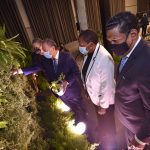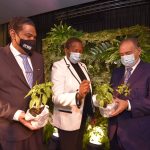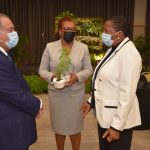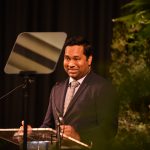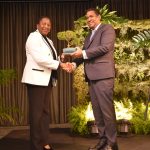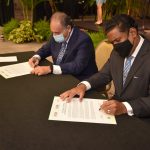The Cropper Foundation in partnership with ANSA Merchant Bank in Trinidad and Tobago and Barbados, and ANSA Bank in Trinidad and Tobago, and the Capitals Coalition, has launched the Caribbean Natural Capital Hub. It acts as a catalyst for the banks and the wider business community to better their impact on Nature in a collaborative initiative which is unprecedented for the Caribbean region.
The launch took place on Tuesday 12th July at the Port of Spain Ballroom, Hyatt Regency.
The launch of the Caribbean Natural Capital Hub is the next step in the Foundation’s 22 year history of influencing the progression of the Caribbean’s sustainability trajectory, by bringing policy and practice together with science. Beginning with the Foundation’s seminal work in the Millennium Ecosystem Assessment, where it led the Caribbean Sea and Northern Range of Trinidad assessments, the Foundation’s work in bringing together ecosystem science and policy making continued on into the 2010s with the Project for Ecosystem Services and other initiatives. This landmark Caribbean Natural Capital Hub is the first major partnership between the private sector and the Foundation.
Omar Mohammed, Chief Executive Officer, The Cropper Foundation said this initiative with ANSA Merchant Bank and ANSA Bank is a shining example of multi-stakeholder partnership for sustainability, “The private sector, and more specifically the financial sector, is possibly the single biggest catalyst for change globally. The fact that some of the most significant financial institutions in the region, also born and raised, as it were, in the Caribbean, have taken this courageous step forward in sustainability leadership is therefore incredibly noteworthy. It is also noteworthy that this has not been a ‘today for tomorrow’ partnership, but one that has been tended and grown over almost three years of considered conversation, planning, and imagining between The Cropper Foundation, The Capitals Coalition, and the leadership of ANSA Merchant Bank.”
The Hub, Mr. Mohammed noted, will bring together and catalyse a bold movement of progressive Caribbean companies and institutions; will catalyse the expansion of Caribbean knowledge about the role the private sector can play in financing, embedding and advocating for more pro-nature and sustainable economic models; and lastly, he said it will serve as the conduit to channel this growing Caribbean knowledge base into the global conversation around the creation and adaptation of decision-making frameworks around value and nature.
Mr. A. Norman Sabga, Chairman of ANSA Merchant Bank Limited and Executive Chairman of the ANSA McAL Group stated the Natural Capital Hub will help to integrate biodiversity issues into public policy and private sector strategy across the Caribbean, “We all know that financial institutions are at the heart of every economy, and we believe that this initiative will have an enduring and positive impact on the economies of all the countries in which we operate across the Region. We intend to embed new processes into the way we do business. The Natural Capital protocols we will adopt, will identify, quantify, and then allow us to communicate publicly how our operations affect, or are reliant on Nature’s resources. Where the impact is a negative one, we will take steps to offset or mitigate to ensure the durability of natural assets.”
Giving background on the initiative, Gregory N. Hill, Managing Director of ANSA Merchant Bank Limited and Chairman, ANSA Merchant Bank (Barbados) Limited, noted that the partnership with the Caribbean Natural Capital Hub will have a lasting impact on future generations, “Our commitment goes to the heart of how we conduct our Banking business. We think globally, and act regionally and locally. It has taken a small team of us, over two years to reach this point, where I am confident to stand before you today and make such a commitment on behalf of our Banks. Simply put, we are embarking on a journey where we will learn to embed the Natural Capital Protocols into all our operations. We will then be able to identify, quantify, and communicate publicly, the ways in which our operations affect and are reliant on Nature’s assets.
“Our goal is to use this assessment, to pioneer the first, private sector led, Natural Capital Report in the Caribbean. This annual Report will explain and document, the economic and financial value of our impact on the capital assets of our region. The region in which we all live today and raise our families, with the hope that our children can be afforded the same opportunity,” he continued. Under the Hub, Mr. Hill noted, there will be several initiatives such as Grant Challenges for SMEs, Start-ups and Innovators in Trinidad and Tobago and Barbados, Sponsorship of a Citizen’s blog, and much more. To ensure the success of the Hub, he revealed some of the actions that the Banks may take, such as, offer preferential banking terms to our borrowing clients in sustainable businesses; pivot its investment offerings to widen the pool of products to Blue or Green Mutual Fund investment opportunities for its investing clients; enhance its sustainability engagement with Gen Z and Millennial influencers, who believe in important “causes” – and collaborate openly with this next generation of Ansa Banking clients; offer special incentives to projects and businesses that can demonstrate the need and their action, to clean up their business practices, among many other forward thinking incentives.
The Honourable Pennelope Beckles-Robinson, Minister of Planning and Development said this country as well as several other CARICOM states have faced chronic and acute environmental problems, many of which are avoidable, “While the Government has a major role to play, there is only so much any administration can do on its own. The cooperation of its citizens, especially its corporate citizens, therefore, is essential to any successful effort to surmount environmental liabilities and turn them into opportunities and gains. What I like most about this concept of the Natural Capital Hub is that it is based on the platform of an emergent form of accounting which considers the worth of ecological assets. The concept takes into consideration that with care, ecological assets and services add value while reducing costs in any given development and with neglect or inappropriate use, they depreciate exponentially. These are terms any businessman will understand and appreciate, once they are explained in the right context.”
Also speaking virtually, Marta Santamaria, Senior Director, Capitals Coalitions said over 400 organizations have joined the international coalition whose mission is to help organizations make holistic decisions that create value for nature, people and society alongside businesses and the economy. She explained, “We do three things at Capitals Coalitions. Firstly, we continuously work to change the metrics of success to include not only financial elements, but also nature, people and society. We work with partners like PWC and Standards and Poor to assess impact valuation of companies or banks to the environment or to people. Secondly, we change the conversation and improve the skills of all relevant stakeholders by reaching out to all relevant experts and providing education opportunities to bridge the knowledge gap, through the recently launched course on Coursera. Lastly, we change the rules of the game and advocate for ambitious policies.”
The Statement of Intent from ANSA Merchant Bank in Trinidad and Tobago and Barbados, and ANSA Bank in Trinidad and Tobago was then read and affirmed. For more information, visit: www.tt.ansamerchantbank.com/natural-capital/
- Mr. A. Norman Sabga, Chairman of ANSA Merchant Bank Limited and Executive Chairman of the ANSA McAL Group (left); The Honourable Pennelope Beckles-Robinson, Minister of Planning and Development and Gregory N. Hill, Managing Director of ANSA Merchant Bank Limited and Chairman, ANSA Merchant Bank (Barbados) Limited, make a selection of plants from the “Living Wall” which guests were invited to choose to take away.
- Gregory N. Hill, Managing Director of ANSA Merchant Bank Limited and Chairman, ANSA Merchant Bank (Barbados) Limited; The Honourable Pennelope Beckles-Robinson, Minister of Planning and Development; and Mr. A. Norman Sabga, Chairman of ANSA Merchant Bank Limited and Executive Chairman of the ANSA McAL Group make a selection of plants from the “Living Wall” which guests were invited to choose to take away.
- Mr. A. Norman Sabga, Chairman of ANSA Merchant Bank Limited and Executive Chairman of the ANSA McAL Group (right) speaks to Frances Bain-Cumberbatch, Chief Legal and External Affairs Officer, ANSA McAL Ltd and The Honourable Pennelope Beckles-Robinson, Minister of Planning and Development following the launch of the Caribbean Natural Capital Hub.
- Omar Mohammed, Chief Executive Officer, The Cropper Foundation, outlines the work of the Hub.
- The Honourable Pennelope Beckles-Robinson, Minister of Planning and Development, is presented with a bonsai plant by Gregory N. Hill, Managing Director of ANSA Merchant Bank Limited and Chairman, ANSA Merchant Bank (Barbados) Limited.
- Mr. A. Norman Sabga, Chairman of ANSA Merchant Bank Limited and Executive Chairman of the ANSA McAL Group with Gregory N. Hill, Managing Director of ANSA Merchant Bank Limited and Chairman, ANSA Merchant Bank (Barbados) Limited signing the Statement of Intent.
- Host Robert Dumas looks on at the Statement of Intent is read by Isabella Green and Aaron Rajack.

